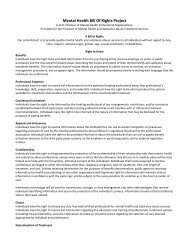2008 Ohio Psychologist - Ohio Psychological Association
2008 Ohio Psychologist - Ohio Psychological Association
2008 Ohio Psychologist - Ohio Psychological Association
Create successful ePaper yourself
Turn your PDF publications into a flip-book with our unique Google optimized e-Paper software.
disorders, and later by limiting research of different treatment<br />
modalities (Roberts & Yeager, 2004). They also point out that<br />
the peer review process has several restrictions. For example,<br />
research being published has high levels of internal validity<br />
(i.e., treatment efficacy) but fails to address issues of external<br />
validity (i.e., clinical utility). Additionally, studies that include<br />
non-significant results or negative trials go unpublished<br />
(Gupta, 2003). As a result, EBP is compromised by not<br />
representing all completed studies that may have an effect<br />
on treatment outcomes (Straus & McAlister, 2000). Further,<br />
most studies are conducted with a homogenous population<br />
of white males and under represent groups such as women,<br />
children and ethnic minorities (Harris, Tulsky, & Schultheis,<br />
2003). Finally, because the random, double-blind placebo<br />
controlled study is expensive, funding sources ultimately<br />
decide what gets investigated, with much of the funding<br />
being donated by pharmaceutical companies whose agenda<br />
may be inconsistent with the needs of the practitioners of<br />
EBP (Williams & Garner, 2002).<br />
Ethical Considerations with EBP<br />
Based on the Ethical Principles of <strong>Psychologist</strong>s and Code<br />
of Conduct, the potential for ethical violations in treatment<br />
using evidenced based practice is apparent. Several main<br />
issues that should be considered include: manualized care,<br />
change in the dynamics of the therapeutic relationship,<br />
negation of non-significant findings, and lack of empirical<br />
evidence justifying the use of EBP.<br />
Manualized Care<br />
Historically, psychological treatment has been a joint effort<br />
between the psychologist and the client. Through this<br />
relationship, an individual treatment plan is developed. EBP<br />
focuses on treatment outcomes for populations rather than<br />
the individual (Kirsner & Federman, 1998). This approach<br />
has been guiding the field to a more manualized form of<br />
care eliminating the client’s contribution to the treatment<br />
plan. As a result, the potential for harm increases because<br />
the psychologist may no longer be taking into account<br />
the individual’s needs, wants, and motivations. Further,<br />
it poses an ethical dilemma by restricting the range of<br />
treatment options and compromising the integrity of the<br />
treating psychologist by forcing him/her to possibly utilize a<br />
therapeutic technique that he/she is not as competent in.<br />
Therapeutic Relationship<br />
There are important aspects about research that are<br />
not addressed in the argument for EBP. First, there are<br />
a multitude of variables that can be contibuted to the<br />
amelioration of a client’s symptomatology. Research<br />
discussed in Roth and Fonagy (1996) has shown that there<br />
is a strong relationship between the effects of treatment<br />
and other variables beyond type of treatment used. These<br />
include therapist variables such as years of training and<br />
years of experience. The most commonly mentioned variable<br />
is the idea that regardless of what treatment method is<br />
used, a person’s condition will improve when a strong<br />
therapeutic alliance is present (Roth & Fonagy, 1996). Due<br />
to the imprecise nature of how to measure the strength of<br />
the alliance, the influence of that relationship may always<br />
be a substantial point of debate. Ignoring the value of the<br />
therapeutic relationship simply because it may be difficult to<br />
measure violates our duty to maintain competence.<br />
Random Assignment<br />
Similarly, forcing the field to use the purported “gold<br />
standard” methodology in research in itself is unethical, as it<br />
would require psychologists to randomly assign which clients<br />
would and would not receive treatment. Additionally, the<br />
idea of a “gold standard” creates a hierarchy within the field<br />
of published research, which devalues other methodologies<br />
(e.g. qualitative research) that can still contribute important<br />
findings (Slowther, Ford & Schofield, 2004).<br />
Evidence for EBP<br />
Lastly, there is debate in the literature as to the empirical<br />
basis of EBP (Goldenberg, 2005; Thyer, 2004). Support for<br />
the effectiveness of EBP in psychological research is lacking,<br />
yet the movement progresses as if the statistical evidence is<br />
in fact sufficient. Ethically, as researchers and clinicians it is<br />
our duty to consider what is best for our clients. This means<br />
that for the few areas where evidence is adequate, empirical<br />
data should be taken into consideration when therapeutic<br />
treatment plans are established. However, psychologists<br />
should be cognizant of all facets of the debate over<br />
empirically based practice.<br />
About the Authors<br />
Michelle Madore is currently a third year graduate student<br />
in the psychology program at the University of Cincinnati.<br />
She is working toward her doctoral<br />
degree with an emphasis in clinical<br />
psychology and a specialization in<br />
neuropsychology. She received her MA<br />
in psychology with a specialization in<br />
clinical psychology at the California<br />
State University, Northridge. Coming<br />
from a military family, Ms. Madore has<br />
already had the opportunity to live in a<br />
variety of locations such as Tennessee,<br />
Arizona, Guam, and Hawaii before moving to <strong>Ohio</strong>. Upon the<br />
completion of her doctoral degree, Ms. Madore would like to<br />
pursue an academic career that will allow her to teach as well<br />
as continue to work on her research interests.<br />
Yvonne Humenay Roberts is currently a third year graduate<br />
student in the psychology program<br />
at the University of Cincinnati. She is<br />
working toward her doctoral degree<br />
with an emphasis in clinical psychology<br />
and a specialization in child health. She<br />
received her BA in psychology from the<br />
University of Michigan, Ann Arbor. A<br />
native of Michigan, she worked at the<br />
American <strong>Psychological</strong> <strong>Association</strong>, and<br />
Children’s National Medical Center, both<br />
in Washington, D.C., before returning<br />
to the Midwest to pursue her doctoral degree. Upon the<br />
completion of her doctoral degree, Ms. Roberts would like<br />
to pursue a career in child psychology that will allow her<br />
to advocate for youth and their communities, as well as<br />
continue to work on her research interests.<br />
THE OHIO PSYCHOLOGIST AUGUST <strong>2008</strong> 22











